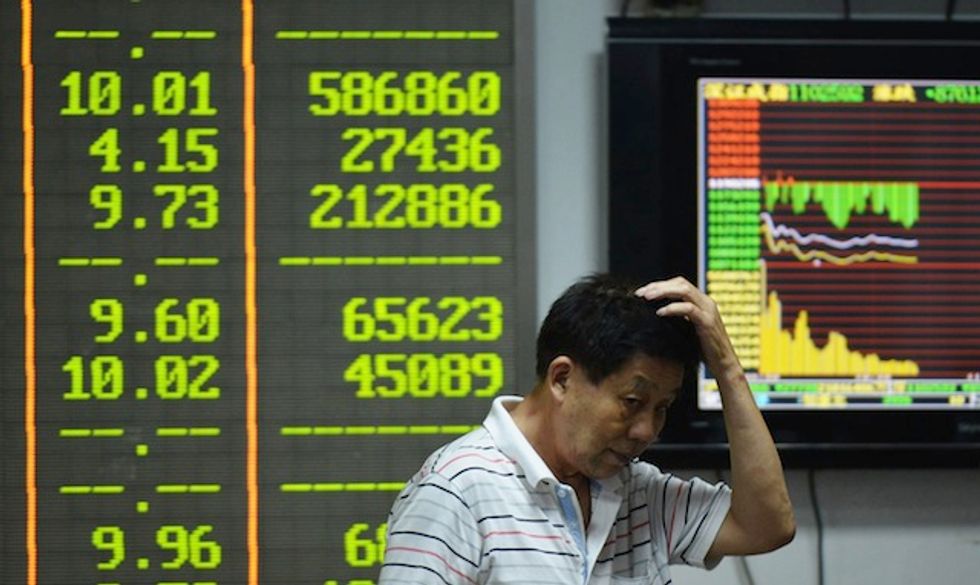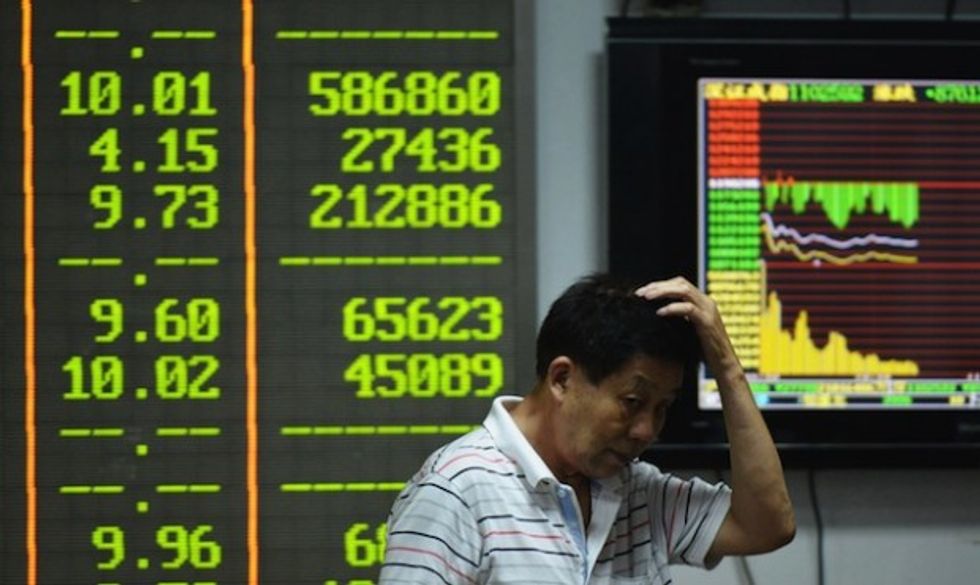
An investor gestures in front of screens showing share prices at a securities firm in Hangzhou, in eastern China's Zhejiang province on August 24, 2015. (Photo: STR/AFP/Getty Images)

Conventional wisdom at the moment says that China’s coming unglued and the country’s stock markets pose a grave danger to global investors.
It’s communist, it’s a Ponzi scheme, it’s ruled by insiders, it’s leveraged up to its eyeballs, ghost cities … all the usual tired arguments are being rolled out as if they’re somehow new again.
In reality, the real risk isn’t being reported. In fact, it’s not even being talked about.

Here’s what you need to know about China...
The ongoing media narrative about China is brutal, with legions of talking heads and mainstream pundits whipping up story after story about how the world’s second-largest economy is falling apart.
Gordon Chang, best known for his 2001 book “The Coming Collapse of China,” noted on CNN recently that “China could be in the world’s greatest depression and they would still report 7 percent.” (He’s alluding to the fact that “everybody” knows Chinese economic data is manipulated.)
Meanwhile, China bears like Jim Chanos have returned with cataclysmic warnings about why the Chinese market meltdown will mean the end of the financial universe as we know it.
“Whatever you might think, it’s worse,” he told CNBC’s “Fast Money” on August 21.
Never mind that he’s an avowed short seller – or the fact that people have been saying exactly the same thing about U.S. markets since March 2009, right before the S&P 500 took off on a 186 percent run.
A little perspective is in order.
First, if China’s market were really the global colossus the media’s made it out to be, our markets would have taken that into account years ago and shifted to the Far East accordingly.
But they didn’t, and they won’t for a long time.
“But… they’re really volatile,” goes the thinking. The argument states that investors have no business setting their sights on the Red Dragon because our own markets are more stable.
Uh-huh … after the wild 1,000+ point drop in the Dow seen on August 24 and the following Wednesday’s 619-point rocket ride higher, ask yourself if you really believe that. I don’t.
No doubt Chinese stock markets are a rollercoaster ride. In fact, they’re the most volatile on the planet at the moment after Greece.
But the Chinese stock market meltdown is a drop in the bucket compared to the 78 percent implosion when the Dot-bomb bubble burst here in 2000 and the 84 percent shellacking in Russia after that country defaulted in 1998.
The U.S. economy has absorbed far bigger shockwaves from overseas economic implosions before. And it will again.
 Traders and visitors depart after the closing bell of the New York Stock Exchange on September 16, 2013 in New York City. The Dow Jones Industrial Average traded up 119 points, closing at 15,495. Five years after the beginning of the financlial crisis, Wall Street has more than recovered its losses, although unemployment nationwide remains high.
Traders and visitors depart after the closing bell of the New York Stock Exchange on September 16, 2013 in New York City. The Dow Jones Industrial Average traded up 119 points, closing at 15,495. Five years after the beginning of the financlial crisis, Wall Street has more than recovered its losses, although unemployment nationwide remains high.
Credit: Getty Images
With the exception of the Nasdaq collapse in 2000, every other major crash since 1929 was caused by a breakdown that was either banking or debt-related. China’s stock market “disaster” is merely an internal adjustment that’s bringing prices back down from nosebleed levels. Keep in mind, between June 2014 and June 2015, China’s Shanghai Composite Index rose by 150 percent.
That, too, is normal for China, where individual investors having little or no experience investing account for an estimated 70 percent of all stock market transactions. Some 67 percent of the millions of investors there have less than a high school education, according to a survey reported by The Guardian.
Further, Chinese A-shares – meaning those traded on mainland exchanges – are largely blocked from foreign investors. That means Chinese investors can bid them up to their hearts’ content almost in complete isolation and without the institutional selling that would otherwise balance that out.
Things are so bad that investing has become a spectator sport, with tens of thousands of brokerage houses in cities all over China providing theater-like seating so customers can chart the rise and fall of their investments.
I’ve been to more than a few of them over the years, and you’d think you were in Vegas at the craps tables with the way emotions flow through the crowd.
In the U.S., roughly 70 percent of trading volume is generated by institutions. That gives our markets a stability that most investors either take for granted or have never thought about before. Further, U.S. markets are open to millions of participants around the world, resulting in a constant stream of buying and selling rather than unidirectional, manic buying or selling.
Finally, many Chinese bears are concerned that money will flee China and suck the lifeblood out of the world’s global growth engine. This isn’t really the big deal they make it out to be, either.
Only about 7 percent of Chinese households have invested in Chinese markets, allocating an average of 9 percent of their wealth. Either way, that implies that more than 90 percent of Chinese households haven’t invested in their country’s stock market… yet.
In reality, money leaving China would be great for one simple reason: The vast majority of it will head straight for the most sophisticated and stable stock market on the planet – ours.
Pundits wrongly equate the direction of a country’s markets with the trajectory of its GDP. That’s a loose correlation at best because the former is a financial instrument while the latter is an economic one. Even if growth has slowed from 7 percent to 4 percent, that’s not the disaster everybody thinks, especially when you consider how central banks in Europe, the United States, and Japan have spent trillions with very little to show for their efforts.
The real risk here is something nobody’s talking about – that Beijing uses current market conditions as an excuse to slam down on the economic reforms that have gotten it this far.
If you think things have been wild now, imagine what happens if Beijing actually cuts off trade and reverts to Soviet-style communism rather than the capitalist version they’ve adopted.
So sit back and enjoy the entertainment as others squabble over what every squiggle in China’s markets may or may not mean. The louder the Chinese doomsayers become, the more likely they are to be wrong yet again.
Growth there may slow, but it won’t grind to a halt barring a complete policy reversal from Beijing… and that’s something 1.367 billion consumers will see to it that never happens.
–
TheBlaze contributor channel supports an open discourse on a range of views. The opinions expressed in this channel are solely those of each individual author.